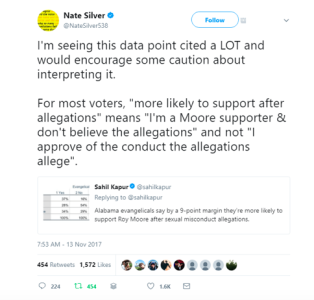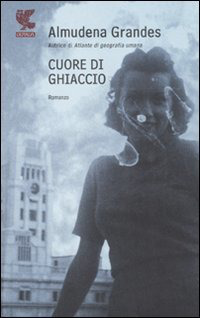When I typed up a quick blog post yesterday, I did so assuming that Roy Moore was about to win the Alabama Senate seat.
I was wrong.
Thank God.
To some, that may sound rather strange. After all, I am precisely the sort of person that was supposed to carry Judge Roy to victory: I am Pro-Life, white, and evangelical in my theology.
According to the media, I am supposed to belong to that very “base” that was going to make the difference–despite no fewer than nine allegations of sexually predatory behavior toward children.
And despite Moore’s claim that “many problems would be solved” if we scrapped all constitutional amendments after the 10th one (Just so we’re clear: the 13th ended slavery; the 15th gave all races the vote; and the 19th gave votes to women).
Well, I do not belong to that “evangelical base”–because, in some cases, there’s nothing evangelical about it.
REQUIUM FOR “EVANGELICAL”
As some news outlets have been quick to trumpet, Moore’s strongest support came from the self-styled “evangelical” voter.
The most vexing evidence for such logic, came in a poll showing that a plurality of Alabama “evangelicals” reported being “more likely” to support him after numerous allegations of child sexual misconduct than before.
This left many of us scratching our heads.
Who could possibly be “more likely” to support someone “after” reports that he repeatedly stalked underage girls at the local mall while dressed like the cartoon sheriff from the movie Toy Story?
NOT SO FAST…
As many have pointed out, however, such polls should be viewed with suspicion (see here).

According the Wheaton professor Alan Jacobs: In parts of the country, “evangelical” has become synonymous with “whites who watch Fox News and consider themselves [vaguely] religious”–regardless of church attendance, Bible reading, or basic theological beliefs.
And while I love those people, that is not what the word means.

In short, the label has been corrupted.
In Roy Moore’s case, it was equated with the worst elements of partisan politics—hence it hangs like an albatross around the neck of many faithful and devoted Christ-followers.
(For what it’s worth, it also hurts the Pro-Life movement in the long run–like making Bull Connor the face of your anti-human trafficking campaign.)
Yet while many of us grieve the (earned) destruction of the “evangelical” label, we also worry that to look back longingly at the smoking ruins is to risk being turned into a pillar of insipid salt.
What, then, should one do with this beautiful but now corrupted label?
THE YEAR IS 1955
It bears noting that in 1955, Billy Graham faced a similar decision.
He had once been a self-identifying “fundamentalist,” back when that word was not synonymous with backwardness and bigotry. In its origin, the term had stood for the fundamentals of the faith. As did Graham.
Yet in 1955, he decided to drop the albatross for reasons that sound eerily familiar: it had been irrevocably tainted by un-Christlike beliefs and behaviors.
Even good words can be turned it seems—like raw oysters in the Alabama sun.
So Graham followed Jesus – out of “fundamentalism” in order to stay true to Scripture and the gospel (the “evangel”).
Or as cowboy Roy might say: “When your horse dies, get off.”
HOPPING OFF THE PENDULUM
What one does next, however, is important.
The temptation for many is simply to flee one rival kingdom for another.
If Roy Moore’s “evangelicalism” has turned a blind eye to egregious sexual and racial sins, one simply runs hard in the opposite direction. After all, as Justice Ruth Bader Ginsberg once remarked:
The true symbol of the United States is not the bald eagle. It is the pendulum.
But what if…?
What if it is partly our love of pendulums that caused this very mess?
NOW FOR THE GOOD NEWS
My suggestion, then, is rather different: flee Roy Moore’s evangelicalism, but take the real “evangel” (i.e., gospel) with you
Because the real “evangel” is alive and well.
Just don’t look for it primarily in the halls of power.
That’s the same mistake we’ve been making for two thousand years: we long for thrones and forget to check the manger.
“I sent you prophets,” says Christ, “but you wanted lobbyists.”
“I sent you shepherds, but you wanted merchants of outrage.”
If you want the real evangel, here is some advice:
Look to the local homeless shelter, where Christ’s hands and feet are serving dinner to the other (equally valuable) members of his body.
Look to the recovery ministry meeting nightly in the church basement, sans cufflinks and news coverage.
Look to the crisis pregnancy center, where women who’ve been there reach out to women who are there.
Look to the high school football star (John) who takes my college Bible class even though it won’t count for credit at his eventual State school–he takes it because he loves Jesus.
Look to the college women (that I know) who spend their Spring Break fighting human trafficking in a Southeast Asia, rather than partying on some sandy beach in Destin.
Look to the group of older Christian women (the godly grandmas) who gather to encourage my young wife with wisdom gained from generations of parenting.
Look to the African-American couple serving faithfully in a predominantly white church, because they believe that the journey toward multi-ethnic community is worth it, even if it’s difficult.
And look to the Catholic nun, kneeling peacefully in the cold rain outside an abortion clinic, praying for the souls inside (doctors, mothers, and babies).
This is the REAL “evangel.”
It’s alive and well.
And in that sense, I don’t give a flying flip what happens to the Roy Moore version.
Share this:




